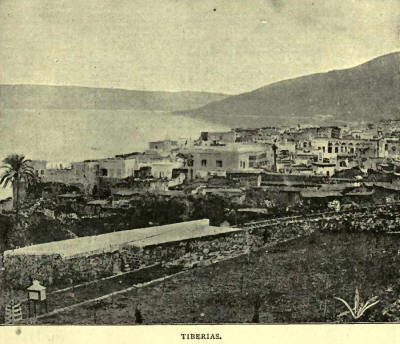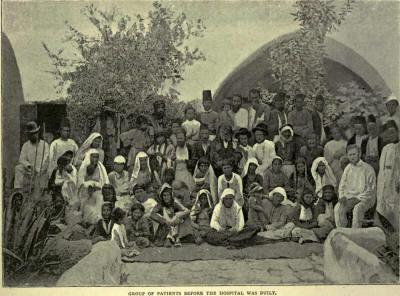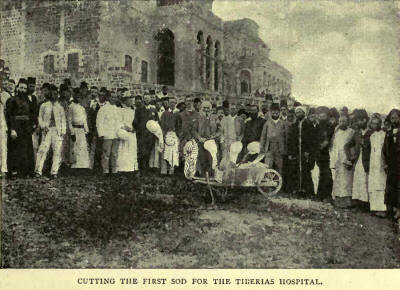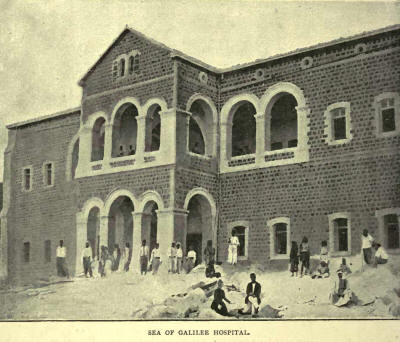|
IN 1884, I was appointed by
the Free Church of Scotland to work as a medical missionary amongst Jews and
others around the Sea of Galilee. My first months were spent with Dr. Vartan
of Nazareth. He had been in the country since about 1860, and being the
only medical man in Northern Palestine, he had often been called to minister
to the sick in Tiberias. His services were gratefully appreciated; and it
was through his influence that I was able to rent a house from one of the
chief rabbis, and so to establish myself as the first resident missionary at
the Sea of Galilee.
I had been well warned
regarding the unhealthiness of the place, [The deaths that have taken place
in the mission circle have not been due to any special condition of Tiberias.
Apart from the intense heat in summer, Tiberias is as healthy as most
Eastern towns, and quite bearable by Europeans. except during the three or
four hottest months.—D. W. T.] and the fanatical nature of the inhabitants,
Jewish and

Moslem; but the needs of the
place appealed to me in a way that I could not resist. Crowds soon came and
besought me to heal them and their sick friends; but when they understood
that I was a Christian missionary, and commended to them Jesus of Nazareth
as the Messiah and as the Lamb of God which taketh away the sin of the
world, their indignation was roused, and they determined to rid their holy
town of this deceiver of the people." The rabbi who had let me the house was
denounced in the Hebrew newspapers, and he tried to get me to leave. Once
when very ill I was taken by night by Dr. Vartan to Nazareth. I soon
recovered, but a report that I had died was spread in Tiberias by some of
the Jews, evidencing what they hoped or anticipated. "Cherems " or bans of
excommunication from the synagogue on any who, whether sick or not, visited
the missionary were publicly proclaimed from the various synagogues. The "haluka,"
or alms from Europe, etc., would not be distributed amongst any who
disobeyed the order of the rabbis ; and so for a time the mission was
boycotted by the Jews.
There were, however, Moslems
and a few Greek Catholic Christians in Tiberias who continued attending the
dispensary, and in many cases they were greatly benefited. So some sick
Jews, and especially some Jewesses with sick children, braked the bans of
the rabbis, and sought the aid of the Christian doctor. Now was the critical
time; but the devotion of the mothers to their children proved strongest,
and the bans began gradually to be forgotten, though now and then there
would be a fresh outburst of opposition. Very gradually the opposition was
overcome, and on passing through the streets grateful patients would take
off their hats, children would run to kiss the doctor's hand, and many would
entreat him to step aside and see their sick ones.
One of the Jewish rabbis had
been specially bitter and stubborn in his opposition, but it was removed in
the following way. His daughter-in-law got somewhat disturbed in mind, and
she was taken to the great synagogue of Rabbi Meir, near the warns baths of
Tiberias. There she was kept within the iron railing around the tomb of the
late `yonder-working rabbi, that his good spirit might drive out the evil
spirit that was in her. Her husband grew tired of this procedure, as there
were no signs of improvement, and he sought my advice. Rational treatment
restored the poor woman to a sound mind.
Some time later the rabbi
himself fell ill with an inflamed sore throat. He would not deign to send
for me; but one morning, when he was almost suffocating, his son (whose wife
had formerly been my patient) rushed into my house, and frantically besought
me to come to his father. I was able to give him immediate relief, for which
he has never ceased to be grateful, and, as far as I know, he has never
since opposed the medical mission.
Great difficulty and
discomfort were experienced in working in native hired houses. Tiberias,
from its low position (682 feet below sea-level), is excessively hot, and
has the reputation of being the scat of the "king of the fleas!" Most
probably every Eastern town has such a king of its own. Unfortunately there
were other discomforts than vermin of various kinds and occasional snakes.
Worst of all, perhaps, were the insanitary odours all around.
The only suitable site for
mission buildings was to the north of the town, adjoining the boundary wall.
It was owned by the mufti, the religious head of the Moslems. We had coveted
it from the first time we visited Tiberias; but to have asked for it would
probably have been to lose it, considering the opposition of the government
to all foreigners, and especially to missionaries. After waiting a few
years, the owner, becoming a friend, offered to sell it, and we bought it
for £60. Very great difficulty was experienced in obtaining title-deeds,,
and before receiving them an understanding had to be signed that there would
not be erected on the ground either a hospital, school, or church without
express permission from. the Sublime Porte. Again, when receiving local
permission to erect the two dwelling-houses that now adorn the plot, another
undertaking had to be signed that they would not be converted into either
churches, schools, or hospitals, or any other building for which sanction is
previously required from Constantinople. In 1890, the first mission house
was occupied by the Rev. William Ewing, who in 1888 joined me as clerical
colleague, the second or medical missionary's house being occupied in 1892.
Meanwhile, a kind of hospital
work was being carried on in a native house, where serious cases, especially
those requiring operative treatment, were attended to. It began in this way:
I had already frequently performed operations, and allowed the patients to
sleep on the floor in the waiting-room, so as to be under my constant
supervision. One day there was brought to the waiting-room a poor Moslem
woman from a distant village, who was suffering from a diseased bone in her
leg. The smell was so offensive that she was obliged by the other patients
to wait in the court outside. The painful part had been cauterized by native
practitioners, and was now gangrenous. I informed her that it would need
daily attention for a long ` time and advised her to get a lodging in town,
where I would visit her. An hour or two after, the poor woman returned
exhausted, carried on the back of her mother, and begged to be allowed to
lie and die at peace under a low archway in the dispensary court. She had
sought in vain for a lodging. Even in the khans, or stables, she was not
allowed to remain, on account of the smell from her leg. I sent my Jewish
servant, who was full of sympathy for her, to try to hire a whole room, in
which I might place her. We got one from the chief rabbi, who had been my
patient; and here, after an operation, the poor woman was tended till she
made a good recovery, and left with feelings of gratitude in her heart that
no words could express.
In this room (about sixteen
feet square, which by an upright and a horizontal partition was divided into
three apartments, and hired for ten francs a month), with one Jewish woman
as nurse, cook, cleaner, etc., we had our first hospital, containing
sometimes as many as eight patients. (A group of some of these patients may
be seen in the accompanying picture.) Jews as well as Moslems were treated
here; but several required operations that could not be undertaken unless in
proper premises, with skilled nursing. Hence I applied to the local governor
for advice as to how to procure a firman or permit from the Sublime Porte to
erect a proper hospital. He was afraid to have anything to do with the
matter, and advised me to apply directly to Constantinople. I visited
Constantinople. The application was sent in through the British Embassy, and
the petition, some months afterwards, was submitted to the local authorities
at Tiberias for their verdict. A new local governor was then in Tiberias;
but,

fortunately for us, he and
several of his predecessors and associates who had been ailing were indebted
to us for medical aid. Some native gentlemen, one especially, used their
influence with the court, and a favourable reply was returned. The firman
was granted, to the astonishment of all who knew the usual delays and
difficulties encountered in such matters.
As originally planned, the
hospital was to be built on part of the first plot of ground bought. On that
site a large sum of money would be required to raise the foundations to the
level of the road, but there seemed no alternative. An adjoining piece of
land was much more suitable; but there seemed no hope of obtaining it, as it
was public ground, and often used by travellers for camping. In God's
providence, a high military official, the agent for the Sultan's private
property in the district, visited Tiberias, and saw our dwelling-houses so
nice and clean and airy. He expressed a desire to build one for himself
something like them, and asked if he could have the adjoining piece of
ground. It was at once given to him, with the best title-deeds, at a merely
nominal sum. While residing in Tiberias he had several tinges been our
patient, and was very friendly. Later on, at a most opportune* moment,
whether frightened by the extreme heat of summer, or for other reasons, he
gave up the idea of building or living in Tiberias, and offered the ground
to us for one hundred Turkish pounds. The title-deeds iii our naive were
placed in our hands several days before we were able to collect the money
for payment.

The original plans of the
hospital were modified to suit the new site in time to be sent to
Constantinople and embodied in the firrnan afterwards issued. Not only had
we thus obtained a better site, but the cost of the site was far more than
covered by the saving in the foundations in the new site, as the rock was on
the surface, and much material was obtained from a quarry which was opened
within the ground.
In the spring of 1893, the
ceremony of digging the first sod (or rather, of excavating the first
basketful of earth) for the foundations of the hospital was performed by
John R. Miller, Esq., of Glasgow, a member of the Jewish Committee, and an
intimate friend of the late Dr. Andrew Bonar, so much associated with' the
beginning of this mission. The governor, who was present, read aloud the
firinan sanctioning the building in the hearing of the large crowd gathered
around. The hospital was erected without a hitch or interruption, in a
remarkably short tinge, and by native workmen superintended by Germans. By
the end of 1893, the building was finished.
Thus was erected the first
hospital that has ever stood on the shores of the Sea of Galilee. Built with
such manifest tokens of God's overruling providence, surely He looks down
Upon the undertaking with approbation, and will bless the efforts of His
servants who, striving to walk after the example of their divine Master,
"heal the sick, and say, The kingdom of God is come nigh unto you."
The hospital has
accommodation for twenty-four beds and six cots. Each bed is named after its
supporter.

Attached to the hospital
there is an outdoor or dispensary department, where, on an average, between
forty and fifty patients are attended to daily; but sometimes as many as one
hundred seek advice in one day. A lady, in memory of her sister, has given
£100 for the erection of a room to be used as a shelter for outdoor patients
who come from a distance and require to remain overnight.
The heat in Tiberias during
summer being excessive, trie hospital will be closed during the hottest
months; but it is hoped that the dispensary department will be kept open all
the year round, with the help of a native medical assistant.
In summer the missionaries
work in Safed, which is over three thousand feet above the lake, where there
is a branch station, with boys' and girls' schools, and a medical mission
under a native assistant, who is a graduate in medicine of the American
Mission College at Beyrout and of Constantinople. Here there is a very large
dispensary practice, especially in summer, the population being more than
four times that of Tiberias.
Our time is chiefly taken up
in attending to those who come to the medical mission ; but there are many
very ill in their homes in the town and in the villages and Arab encampments
around the lake who cannot come to us. If they are to be reached at all, we
must go to them.
The Jewish and Moslem homes
are now all open to us for medical and friendly visits, and when religious
topics are introduced, as a rule they are listened to with patience and
interest.
In the homes of the Jews, and
even in their synagogues, which are the only homes many •poor Jews have, we
have expounded from Moses and the prophets the scriptures concerning Christ
as fulfilled in the New Testament, and pressed Him on them for acceptance;
but it is almost impossible in the present state of affairs for a Jew to
confess Christ openly, unless he is willing to face persecution of the most
bitter kind, to leave his kith and kin, and to run the risk of starvation
and even death.
On one occasion I was called
to see a poor woman at the Moslem village of Fik (Aphek), on the uplands on
the other side of the lake. She had previously benefited by treatment at
Tiberias, but had had a relapse, and was unable to travel. I arrived late.
After partaking of the ordinary family supper of a mess of pottage, I spent
an hour or two telling the men and women of the "Good Physician," who used
to walk around the lake lying just below them, but of whom they knew
nothing. At last, quite exhausted, I begged to be allowed to sleep. A
mattress, pillow, and quilt were spread for me on the floor just where I
sat, at the side of a wooden fire, the smoke from which had to escape as
best it could from the unglazed window and broken door. I tried to sleep,
but it was impossible. The men who were in the room were snoring, and the
sheep were quietly chewing their cud, but the poor woman I had specially
come to see whiled away the time by talking to the women who were "sitting
up " with her.
"Did you hear how he spoke?"
she said. "That's how he speaks to the people over in Tiberias. He speaks to
the women as if they were men, and they don't regard it a. sin to eat such
and such things."
She tried to repeat some of
the ideas she had gathered at the medical mission and at the girls' school,
which she had also visited. She repeated the text, "God be merciful to me a
sinner," and showed she had got a grip of what sin, mercy, and a Saviour
were. My eyes were filled with tears of joy and gratitude to God that He was
apparently blessing our work, and that His word was not returning unto Him
void. On a subsequent occasion I visited some Moslem villages and Arab
encampments farther east, and was everywhere well received. One grateful
patient, Sheik Hamad, sent and shifted my camp to his village, where he
entertained me with his best. He had come to Tiberias with a diseased leg,
fearing that it would never be of any use to him ; but he returned home, not
only with a useful leg, but with a Bible which he could read, and a hunger
after the truth as it is in Christ Jesus.
At our camp we found him
still eager to learn more. He took us to the mosque, that we might exhibit
the magic-lantern to the people; but although he seemed greatly looked up to
by the people as one of the chiefs, we deemed it more prudent to have the
meeting in the large guest-room of time place. When the meeting was closed,
Sheik Hamad said that I had missed out certain portions of the life of
Joseph, which I had exhibited. This was an evidence to me that he had been
reading his Bible, which I had marked at several places, and I told him he
must tell the people the whole story. I learned that he had often read from
his Bible to a crowd of astonished hearers. He is not far from the kingdom,
but humanly speaking, it would be impossible for him to profess Christianity
and live in the land. He would likely get, unawares, a cup of coffee with a
little arsenic in it, and die what would be called a "natural death."
Our medical mission is
opening the door for the gospel among both Jews and Moslems. |

